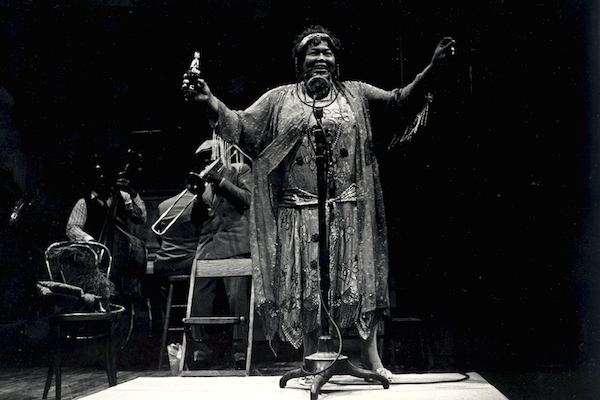Mother of the blues and creator of a lesbian anthem
Ma Rainey is the undisputed “Mother of the Blues” and was a prominent figure in the Harlem Renaissance. She inspired poetry by Langston Hughes and Sterling Brown and even Alice Walker’s perception of African-American womanhood in The Color Purple.
Born Gertrude Pridgett in Georgia in 1886, Ma Rainey first started her career singing and dancing in a local talent show before going on tour with The Rabbit Foot Minstrels. At the age of 18, she married William “Pa” Rainey and they began to tour as the Assassinators of The Blues.
Ma separated from Pa in 1916 and went on to have her own successful solo career, playing with greats like Louis Armstrong and releasing her first record with Paramount Records in 1923.
Throughout her career, Ma Rainey recorded over 90 albums. One of her most famous hits, “See See Rider” would go on to have more than 100 covers and has been both inducted into the Grammy Hall of Fame and preserved in the U.S. Library of Congress. Rainey, who passed away in 1939, was also inducted into the Rock and Roll Hall of Fame in the Early Influences category in 1990.
Though her accolades are numerous, Rainey also had a rather intriguing personal life. She often alluded to her sexual encounters with women and frequently attended A’Leila Walker’s—daughter of Madam C.J. Walker—prominent queer parties. In 1925, she was arrested when she was caught throwing an all-women’s “indecent party.” She is said to have been bailed out by Bessie Smith, another prominent queer woman and singer she personally mentored. Smith that would later go on to be known as the “Queen of the Blues.”
Though many accounts of her life do not mention her bisexuality or homosexuality, Ma Rainey was not afraid to express her feelings through lyrics. Since the blues culture was underground and considered “the devil’s music,” singers of the genre had the ability to be much more open about cultural taboos.
In her music she often refers to “B.D. women” (bull dagger or bull dyke) and “sissy men.” She even released “Sissy Blues,” a song about her husband leaving her for another man that she calls “Miss Kate.”
In 1928, she released “Prove it on Me Blues,” which would come to be considered the lesbian anthem of her time. The song references her love affairs with women while telling her audience she would like to see them prove it.
“They say I do it, ain’t nobody caught me
Sure got to prove it on me;
Went out last night with a crowd of my friends,
They must’ve been women, ‘cause I don’t like no men”
Though the legacy of Ma Rainey seems to have faded as the years have passed, this ground-breaking singer and “Mother of the Blues” is a queer woman of color that we should feel very blessed to call our own.
For more information on Ma Rainey and other queer figures in The Harlem Renaissance, check out Robert Philipson’s short documentaries, “Take the Gay Train” and “T’Ain’t Nobody’s Bizness: Queer Blues Divas of the 1920’s.”


